OnScreen Posted February 26, 2014
What Are the 2014 Oscars Missing?
By Jeffrey Overstreet (jeffreyo@spu.edu)
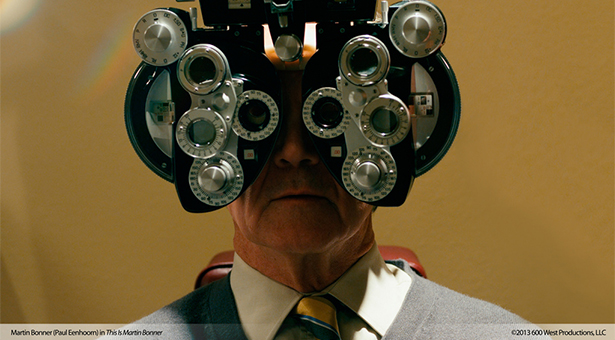 Are the Oscars highlighting the year’s most meaningful movies? Here’s another perspective, using a different set of lenses (just like Martin Bonner does in one of the following movies) ...
Are the Oscars highlighting the year’s most meaningful movies? Here’s another perspective, using a different set of lenses (just like Martin Bonner does in one of the following movies) ...
Is it possible that, in the midst of Oscar season clamor, we’ve missed some of the most meaningful films of 2013?
All nine of the movies nominated for Best Picture at the 2014 Academy Awards are impressive in various ways. But let’s face it: To win the Academy’s approval, it helps to demonstrate the stuff of popularity and prestige. And it helps to play elaborate, attention-seeking games in order to impress the voters. As a friend of mine recently quipped on Facebook, “Any award that requires the qualified parties to intensely campaign against each other is a meaningless award.”
Every year, many of the best-reviewed films around the world get left behind. Perhaps they lack the involvement of celebrities and film industry power-players. Perhaps they lack a big marketing budget. Maybe their visions are modest, unconventional, politically unpopular, or subtle in ways that cannot “compete” in Hollywood’s annual circus.
But Emily Dickinson said, “The truth must dazzle gradually.” We need time to absorb what we’ve seen, to think it over, to discuss it, and — if we’re interested in more than a first impression — to take another look. In time, we may recognize an entirely different set of films as personal favorites and “classics.”
Here’s a challenge: Take a look at these lesser-known works. I suspect that some of them will stay with you, as they’ve stayed with me.
This Is Martin Bonner
Directed by Chad Hartigan
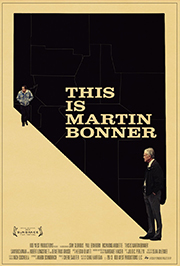
This story about a paroled prisoner and the counselor who befriends him remains the film that moved me most in 2013. I reviewed it earlier this year at Christianity Today, and I interviewed director Chad Hartigan here at Response.
After that, The National Catholic Register’s film reviewer Steven Greydanus saw it and rated it as his personal favorite for the year as well. He wrote:
“Amid the trauma-filled films of 2013, no film spoke to me more profoundly of hope, empathy and spiritual thoughtfulness than Chad Hartigan’s quietly miraculous little character study. Following a church-based prison program volunteer and an ex-con trying to find his way, the film explores the enigma of faith in a postmodern world with extraordinary insight.”
This Is Martin Bonner is currently available on Netflix and home video.
Museum Hours
Directed by Jem Cohen
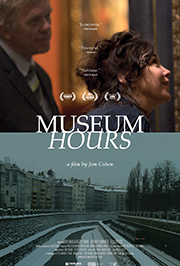
A smiling museum guard meanders through Vienna’s Kunsthistorisches Art Museum. He used to be a rock band manager. Now he’s in a quieter season of life — quiet enough to notice a harried tourist. She’s in Vienna to care for a hospitalized relative, and she takes break in these rooms filled with paintings that illustrate life’s most urgent questions.
The friendship that blooms between them is a rare and beautiful thing. And the way director Jem Cohen encourages us to reconsider our own worlds the way we contemplate great works of art is the stuff of life-changing revelations.
For more about this film, read my review at Christianity Today
Short Term 12
Directed by Destin Daniel Bretton
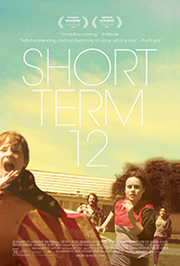
Her name — Grace — may be a little too obvious. But her story of life, love, and lamentation as a supervisor in a group home for foster children is full of raw and realistic details, subtle humor, and uncompromising complexity. It’s also a rough ride — some of these troubled children have scars and vocabularies that testify to the damage done to them.
As Grace listens to, counsels, and protects her charges — sometimes chasing them down on foot when they run away — she gives us a perfect picture of tough love. Actress Brie Larson gives us an intimate portrait of a wounded, principled, passionate hero, and the supporting cast of counselors and children are so convincing that it feels like these events could be happening just down the street.
Who needs The Avengers? When we arrive at the movie’s last, slow-motion shot of real-world heroes saving the world, we feel empowered to go and do likewise.
Upstream Color
Directed by Shane Carruth
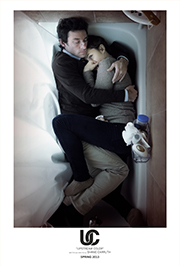
What would happen if an artist with the poetic filmmaking style of Terrence Malick and the darkly ambitious vision of Stanley Kubrick brought to life a mind-bending science fiction romance along the lines of Eternal Sunshine of the Spotless Mind? You might get something like Upstream Color — one of the year’s most visually inventive and intellectually challenging thrillers.
Jeff is a businessman and a fraud who is getting tired of covering up his crimes. Kris works with computer graphics, aiming to produce flawless illusions, erasing all signs of “the man behind the curtain.” Both of them live fractured lives, poisoned by a malevolent chemist who introduced a powerful hallucinogenic parasite into their bodies. But what happens when they begin to wake up from this nightmarish hypnosis?
They’ll find each other. They’ll fumble their way toward love and recovery. And they’ll begin following the mysterious traces of the manipulative devil in their lives.
I can’t promise that you’ll find answers to many of this film’s confounding questions. (Who is the pig farmer who haunts them, sampling incidental sounds? Is he God? Or the devil? Or both?) That’s because Carruth seems more interested in poetic suggestiveness than practical puzzle-solving. He gets your brain buzzing in a way that few movies do. And he implies that we live in a world in which powerful forces seek to corrupt us, but by striving for love and purity, we just might undo some of the damage that has been done and strengthen the things that remain.
Frances Ha
Directed by Noah Baumbach

Director Noah Baumbach is known for portraying the ugly side of human nature with such cynicism and pessimism that some find his movies insufferable. (Did you see The Squid and the Whale or Margot at the Wedding?)
And there’s a lot of ugliness on display among the New Yorkers in Frances Ha.
But something warmed his heart when he made this movie. Perhaps it was his leading lady, Greta Gerwig. She brings an abundance of spunk and spirit to the title character — a twenty-something New Yorker surrounded by people who are settling into adulthood while she fumbles for a sense of identity and purpose. Frances’s quirky personality is magnetic, and those who pay close attention will see how she refuses to let failures and disappointments get her down, how she keeps dancing her way through anxiety towards second chances and new ideas.
Ultimately, for all of the ugliness around her, Frances is dancing herself, and us, toward signs of hope.
Kings of Summer
Directed by Jordan Vogt-Roberts
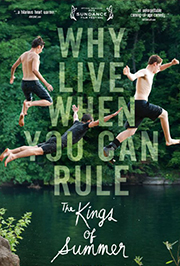
It’s difficult to find films about adolescence that ring true. But this awkward blend of comedy and realism captures the awkwardness that boys know in their late teens when their rebellious impulses clash with their desire to be respected as adults.
We follow the ambitiously imaginative Joe, his exasperated friend Patrick, and their oddball classmate Biaggio as they escape their maddening families to try their hand at independence in a secret forest hideout. Everything seems fine until, as you might have guessed, a girl gets involved.
Most coming-of-age tales paint the adults as heartless and tyrannical, and the parents here are hilariously incompetent. But The Kings of Summer has enough compassion for everybody, and before it’s over we see even the grownups learning and growing.
Like Someone in Love
Directed by Abbas Kiarostami

A call girl, a scholar, and a mechanic drive across Tokyo. Sounds like the setup for a joke, right?
And it is, in a way. Like Someone in Love is a comedy &emdash; a twisted comedy, but one that has the ring of truth.
Akiko, the call girl, is trying to escape the control of her overbearing boyfriend. Her life is empty, and she feels humiliated by how she has failed her grandmother. She seems helpless, lost, and desperate for redemption. When she is sent to entertain Takashi, an elderly scholar, we might think we know where this is going. But no, he doesn’t want sex. He’s paying for companionship, for a quiet dinner, for a sense of the romance he once knew.
Like Someone in Love is a movie about love ’ how much we need it, how we go wrong in the ways we pursue it, and how one world’s ideas about it are passing while another’s are taking over. The old Japan’s ideas were filled with romance, rituals, beauty, and intimacy. But they were also hierarchical in cruel and unusual ways, and women were disrespected, exploited, even abused. The new Japan’s ideas? The world is a marketplace and love, like anything else you might want, can be bought. And women? Disrespected, exploited, and abused.
As dark as things become, this is not an entirely cynical movie. I’m touched by Takashi’s desire to serve someone, and by Akiko’s broken heart for her grandmother. As we look through the eyes of an outsider — the great Iranian director Abbas Kiarostami — at all of the ways they do things wrong, we just might learn a lot about the “right” that they’re all seeking.
Response is a magazine for thoughtful Christians worldwide, rooted in the people, life, and mission of Seattle Pacific University. The magazine explores the encounter between education, faith, and culture, and is an informed voice for Christian engagement in the world. Read features from our latest issue, sign up for a free subscription, and visit our archive of movie-related articles.
What film or films do you think was overlooked at this year’s Oscars? Have you seen these films? Tell us here, and read what others have to say on this moderated bulletin board.
David Schillreff
Posted Thursday, March 13, 2014, at 7:33 p.m.
I was amazed that All Is Lost was overlooked. Redford’s presence on screen was breathtaking and it brought a fresh taste to the whole lost-at-sea genre.
Jeffrey Overstreet
Posted Wednesday, February 26, 2014, at 4:35 p.m.
Thanks, Krista! Funny you should mention Stories We Tell. I was going to include that one, as well as Before Midnight, but I had featured summaries of those two films in the previous edition of Response OnScreen, so I decided to skip them this time. You're right, though ... Stories We Tell is a beautiful, compassionate piece of work
Kristy Quist
Posted Wednesday, February 26, 2014, at 3:27 p.m.
I also loved Short Term 12 — especially the anniversary party at the Mason's parents' house. That's my idea of heaven. Another one I expected to see was Sarah Polley's Stories We Tell, which I found fascinating. I suppose they didn't know whether to put it in as a plain old movie or a documentary, since it blends acting with biography. I've never seen anything like it.
